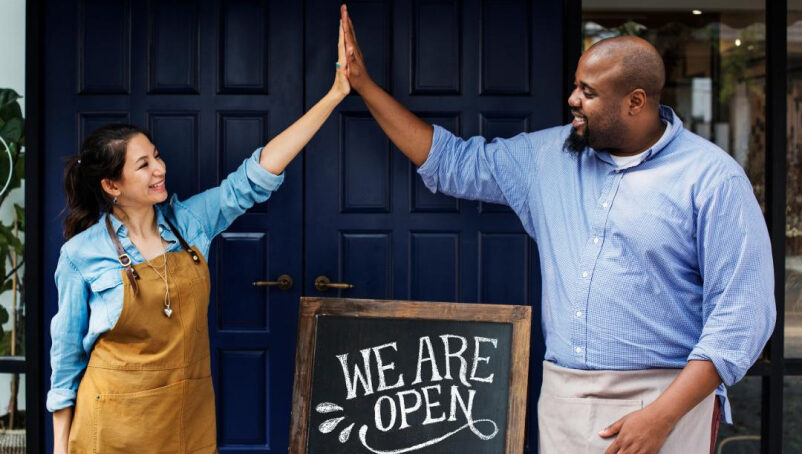Small business owners often think about opening a second location of their local business. But the big question is often this: Should you start a new location from scratch, franchise your business, or buy an existing shop? Watch this to get some quick pros and cons of each:

Grow your business: Start, franchise, or buy a second location?

Each option comes with distinct advantages and challenges. Learning more about them will help you make the best decision for your multi-location business expansion.
Jump ahead to learn:
How to grow your small business: Which business expansion plan is best?
To open your second business location, consider your business goals, resources and risk tolerance to build long-term success. Entrepreneurs have three options for business growth:
- Start a new location. This option gives you full control to replicate the success of your first location and make strategic innovations. However, it can also require more time, effort and resources with no guaranteed return on your investment.
- Franchise a business. Choose this option if you want a proven model with built-in support. If you choose this path, you’ll need to adhere to specific operational rules. You’ll also face upfront franchise fees and ongoing royalties.
- Buy an existing business. For immediate cash flow and ready-to-go business operations, look into buying another successful business. The downside is that it requires a larger initial investment, thorough research and due diligence.
Each growth strategy offers unique benefits and challenges. If control and creativity are your top priorities, a new location might be the best choice. If you want a fast path to profitability, franchising could be ideal. But for fewer growing pains, buying an existing business might be the right move.
How to protect your business expansion
City, state and county laws may require some types of business insurance. Other coverages can also be highly recommended for your particular industry.
Business insurance for an expanding business is usually a policy that includes more than coverage, such as:
General Liability insurance
Sometimes called business liability insurance, general liability coverage is often the first insurance business owners purchase. It can help your business cover costs if you or an employee accidentally damage someone’s property or if someone other than an employee gets hurt.
Commercial Property insurance
Commercial property insurance can help protect many of the physical items you need to do business, such as your gear and inventory. It can help pay replacement costs if your business property is damaged by fire, theft or vandalism.
BOP insurance
A business owner’s policy (BOP insurance) combines general liability insurance and commercial property. Bundling these two policies can be less expensive than buying them separately.
Professional Liability insurance
Professional liability insurance can help protect your business from professional mistakes. This kind of coverage is also known as errors and omissions (E&O) insurance. It is most common for professional services such as accountants, real estate agents and more.
Workers’ Compensation insurance
Workers’ compensation insurance can help cover workplace injuries. If an employee gets hurt on the job, it can help pay for medical expenses and lost wages. It’s often required by state law when you have employees. You can also protect yourself by opting for voluntary business owner’s coverage.
Commercial Auto insurance
If you or your employees drive a vehicle for work, commercial auto can help pay for damages if you or an employee are involved in an auto accident while driving for business.
Look for an insurance provider who can grow with your business expansion and provide the multi-location coverage your business requires.

Option 1: Build a second business from scratch
If you’ve built your small business from the ground up, you know the freedom that comes with creating something uniquely yours. Starting a second location offers the same opportunity to maintain full control over your business and tailor it tightly to your local customers.
It’s also an opportunity to experiment with new products, services or target a different customer experience based on what you learned at your first location.
Drawbacks to expanding to a second location are that it can be expensive and slow-moving. The Small Business Administration recommends you calculate your startup costs so you can get loans or investors and determine when you’ll be able to break even. A solid business plan is critical to set clear goals and secure financing.
Initial costs could strain your resources before you even open the doors, and it could take years for your expanded location to become profitable. Be prepared to pay for:
- Legal fees
- Permits and small business insurance
- Licenses
- Product inventory
- Marketing

Option 2: Franchise a business
When you buy a franchise, you get a business that already has good name recognition with the public. By franchising, you benefit from training and a proven business model. You won’t need to spend time developing your brand, creating marketing strategies or figuring out operations — the franchisor will provide all of this, and you can hit the ground running.
The Census Bureau finds that franchise opportunities exist in almost 300 industries, including hotels, beauty salons, gas stations, fitness centers and daycare centers.
In this business model, you pay a franchise fee for the right to open an outlet, plus royalties based on your sales and often advertising fees. This may require an investment of tens or even hundreds of thousands of dollars.
Franchisors have uniform ways of how their businesses run and look — and you must adhere to their procedures. Owning a franchise can take away some of the creativity of being a business owner. You also have no control over how an incident at the parent company can affect your business.
Despite these risks, franchising remains a lower-risk option than launching a brand-new location. It offers the security of an established model with a support network of other franchisees.
The Franchise Business Review rates the best franchise investments and opportunities. It provides consumers with comprehensive reviews of franchises, including small business ideas with low startup costs.
Your franchise agreement details what’s included and what the business owner must provide. For example, as a franchise business owner, you’ll probably need to provide your own business insurance. The franchise may have rules about insurance, as well.
There may be local ordinances or state laws about how much and what type of insurance you’ll need.

Option 3: Buy a second business
Acquiring a business that is already up and running comes with significant advantages. You inherit a trained staff, an established customer base plus functioning systems and processes. This can significantly reduce ramp-up time as compared to building a new location or opening a franchise.
Buying an existing business also requires significant upfront capital. You may need to secure loans or find investors.
However, due diligence is critical. Thoroughly do your market research and evaluate the business’s financial health. Seek out hidden liabilities such as unpaid taxes, legal issues or outdated equipment requiring costly upgrades.
You should also understand the business culture. Does it align with the values and vision you have for your brand? Are current operations running smoothly? These factors could require additional investment, time and effort to make the transition to new ownership successful.
How NEXT helps small business owners grow their business
NEXT creates customized business insurance packages at affordable prices. We grow with your expanding business so you can get the coverage you need.
Our online application will ask you a few questions and give you coverage options. When you see what you like, you can buy the coverage you need on the spot — all in about 10 minutes.
As soon as your purchase is complete, you can access your certificate of insurance immediately and manage your policy 24/7 via web or mobile app.
If you have questions, our licensed, U.S.-based insurance professionals can help.




